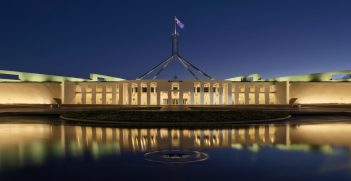30 December 2022: The Week in Australian Foreign Affairs

This week in Australian foreign affairs: Australia-India Economic Cooperation Trade Agreement enters into force, and Marles’ comments at the Biennial Submarine Institute of Australia Conference.
On 29 December, the Australia-India Economic Cooperation Trade Agreement (ECTA) entered into force. In a media release announcing the entry into force, Minister for Trade Don Farrell stated that ECTA “underscores the Government’s commitment to delivering opportunities to diversify trade that are commercially meaningful for Australian businesses.” Farrell further noted that “entry into force this year means Australian exporters will benefit from two tariff cuts in quick succession, the first [on 29 December] and the second on 1 January 2023.” Tariffs have been eliminated “on over 85 per cent of Australian exports” and have been “locked in at zero”, including on “wool, lamb, barley, oats, fresh rock lobsters, cosmetics and many metallic ores, critical minerals, non-ferrous metals and titanium dioxide.” ECTA will also support “tourism and workforce needs in regional Australia by making 1,000 Work and Holiday Program places available to young Indian travellers.” Farrell also noted that the Government “is pursuing further competitive advantages to expand this trade relationship through an ambitious Comprehensive Economic Cooperation Agreement”, which “will address deeper market access and outcomes in new areas including digital trade, government procurement and cooperation.”
In an article in The Australian on 29 December, Farrell expanded on the significance of ECTA’s entry into force, stating that “it is no surprise to [him] that India chose Australia as the first major economy in over a decade with which to complete a trade agreement” and that “Indian consumers appreciate the high quality and assured safety of Australian products, and Indian students value the transformative opportunities our education system offers.” He noted that “trade diversification is a central plank of the Government’s trade policy strategy” and that “Australia is economically stronger when global trade flows freely.” Farrell further stated that “he sees “significant potential for greater exchange of ideas and talent as our people-to-people links [with India] continue to grow” and that this will be supported “by a framework under [ECTA] which will facilitate discussions on the mutual recognition of qualifications, licensing and registration procedures across professional services and regulated or licensed occupations.” He concluded by noting that “there is no single country with more growth opportunities for Australian business to 2035 than India.”
On 23 December, the Department of Defence issued a media release reflecting on the 11th Biennial Submarine Institute of Australia Conference hosted in Canberra last month. Minister for Defence Richard Marles opened the conference, explaining why submarines are “a key component of Australia’s strategic and defence capability requirements.” He noted that “continuing to promote discussion about this capability, its place within the broader defence capabilities and the role it has in building Australia’s strategic space is vitally important.” He also stated that “by virtue of their stealth and the[ir] unique capabilities, submarines can place the single biggest question mark in our adversaries’ mind[s].” Marles further highlighted “the enormous benefit nuclear-powered submarines [will] provide, not only in terms of jobs and an increased workforce, but in relation to Australia’s investment in science and technology.”
Isabella Keith is a weekly columnist for Australian Outlook. She is also an undergraduate student at the Australian National University studying Law and Politics, Philosophy and Economics. Isabella’s research interests include international law and comparative constitutional law.
This article is published under a Creative Commons License and may be republished with attribution.




